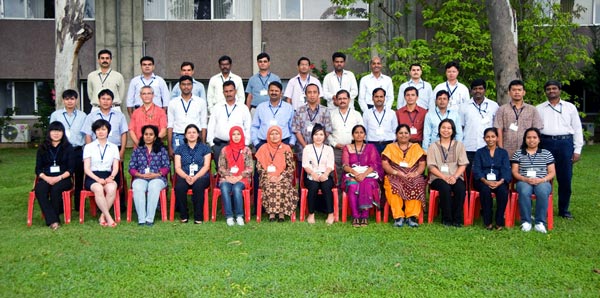To keep pace with the unprecedented increase in maize demand in Asia, maize programs in the region are increasingly using new tools and techniques for maize improvement to achieve long-term food security. One of such tools is precision phenotyping, the theme of a training workshop organized by CIMMYT-Asia at Hyderabad, India, during 29 August-1 September 2012. The workshop was attended by 31 scientists, including maize breeders, agronomists, and physiologists from Bangladesh, India, Philippines, Vietnam, Thailand, Nepal, Indonesia, and Sri Lanka, collaborating with CIMMYT in various Asian regional projects: MAIZE, Affordable, Accessible, Asian (AAA) Drought Tolerant Maize, Abiotic Stress Tolerant Maize for Asia (ATMA); Asian Maize Drought Tolerance (AMDROUT), International Maize Improvement Center-Asia (IMIC-Asia); and collaborators from seed companies.
The participants were lucky to attend lectures by Vincent Vadez (crop physiologist and acting program director of Dryland Cereals, International Crops Research Institute for the Semi-Arid Tropics), P.H. Zaidi (senior maize physiologist/ breeder), L. Krishnamurthy (CIMMYT-Hyderabad consultant), B.S. Vivek (senior maize breeder), Zerka Rashid (CIMMYT project scientist), Raman Babu (CIMMYT maize molecular breeder), and MT Vinayan (post-doctoral fellow at CIMMYT-Hyderabad). Topics covered ranged from the importance of precision phenotyping for crop improvement, maize phenology and physiology, drought stress management, to root phenotyping techniques using mini-rhizotrons and molecular breeding.
The participants also received hands-on training in identifying maize growth stages and useful soil types for abiotic stress experiments and trials, and data analysis and management. During one of his lectures, Zaidi discussed the importance of heat and combined heat and drought stress in tropical maize and CIMMYT’s initiative in this newly emerging issue brought by climate change.
The course was well-received and highly appreciated by the participants, especially for its handson practical part and well-planned lectures.

 Capacity development
Capacity development 
